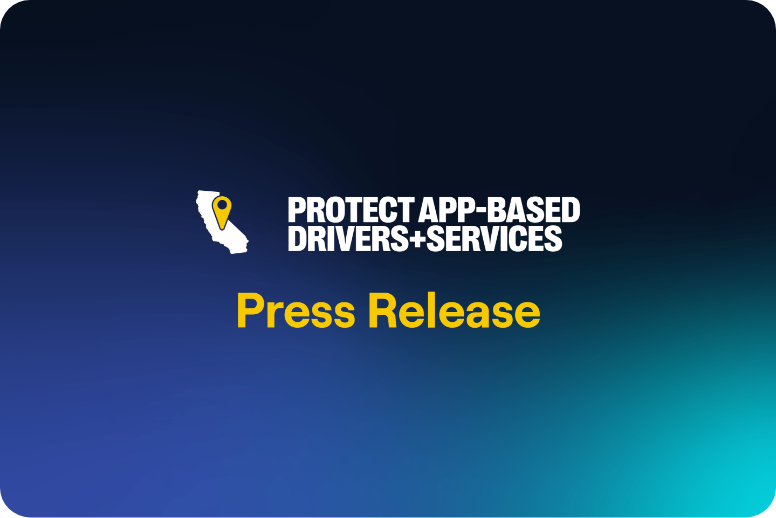Lawsuit hurts seniors, students and small businesses the hardest. Rideshare and delivery drivers support ballot measure to protect their freedom and independence.
SACRAMENTO – Today app-based rideshare and delivery drivers from across the state reacted with anger and frustration that an elected politician in San Diego filed an emergency application for a temporary restraining order seeking to take away the rights of Instacart shoppers in California to earn an income as independent contractors and instead force them to become employees. App-based drivers expressed concern this type of action could extend beyond Instacart and take away the rights of hundreds of thousands of Californians to choose when, where, and how long they work and what companies they work with.
Drivers said this latest action reinforces the need to pass the Protect App-Based Drivers & Services Act for the November 2020 ballot, which would protect the rights of all Californians to earn extra cash as independent drivers while providing new earnings and benefit protections.
“I’m disappointed in the City Attorney’s action. If forced to become an employee, I would lose the supplemental income Instacart offers,” said Natalia Banaszczyk, a public school teacher in the Bay Area who shops with Instacart and uses the extra income to buy school supplies for her students. “Shoppers statewide, not just in San Diego, are now at risk of losing the way we choose to work. We don’t want to be employees, and we want our voices heard. That’s why I support the ballot measure to protect our right to remain independent.”
The Application for a Temporary Restraining Order (TRO) was filed Wednesday, Jan. 29, 2020, by San Diego City Attorney Mara Elliott against Instacart. If granted at a hearing on February 4, the TRO would take away the right of Instacart shoppers statewide to remain independent; if similar TROs are filed against other companies, they could destroy the app-based rideshare and delivery service model and ultimately shut down these services that millions of consumers, small businesses, and disadvantaged communities rely on every day.
“Our partnership with Instacart is strong. The grocery delivery service that Instacart provides helps customers gain access to healthy, better-for-you foods,” said Dorothy Carlow, CEO of Mother’s Market & Kitchen in Southern California. “Instacart bridges us into communities that would otherwise not have access to healthy and organic food options. Together, with Instacart, we have grown our sales which in turn provides more jobs and more growth opportunities for our current and future team members.”
“The ballot measure is our best hope to remain independent,” said Cora Manapat, mother of three from South San Francisco who needs the flexibility to take care of her family. “We get to keep our independence and flexible schedules, and we get new benefits like health care and guaranteed earnings. It’s a win-win.”
Sacramento politicians have pushed a new law (Assembly Bill 5) that threatens to take away the freedom and independence of hundreds of thousands of Californians who earn extra cash as app-based drivers. Politicians want to force app-based drivers to become employees, eliminating their right to choose when, where and how much they work, and what companies they want to work with.
The Protect App-Based Drivers & Services Act is currently gathering signatures to qualify for the November 2020 ballot. More than 30,000 drivers have signed up to support efforts to qualify the initiative for the November ballot.
The measure would protect the rights of Californians who choose to drive with app-based rideshare and delivery platforms to keep their independence. The ballot measure protects flexibility, provides new health benefits and earning guarantees, and strengthens consumer safety provisions.
The ballot measure would also protect the availability of app-based rideshare and food delivery services that millions of consumers use every day, including services that improve mobility for seniors, the disabled and families without a vehicle. These services keep drunk and impaired drivers off our roads and help small businesses such as restaurants and grocers reach millions of new customers.
According to the independent, non-partisan Legislative Analyst’s Office, between 300,000 and 400,000 Californians drive with rideshare and delivery platforms each month. Many earn extra cash using app-based platforms because traditional employment doesn’t fit the needs and realities of their daily lives, including parents who want to work flexible schedules while children are in school, students who want to earn money part-time, retirees looking to supplement fixed incomes or for social interaction and families struggling with California’s high cost of living who need extra income.
The Latest News

Opinion
I’m an Instacart driver: California Supreme Court must protect my job
By Stephanie Whitfield It may sound dramatic to say that app-based driving saved my life, [...] Read more
News
As Prop. 22 heads to California Supreme Court, support doesn’t break along ideological lines
By Bob Egelko Proposition 22, the 2020 ballot initiative sponsored by Uber and Lyft that [...] Read more